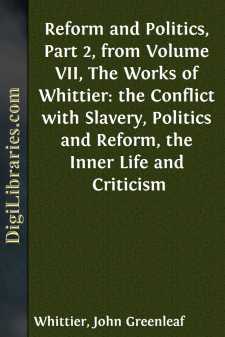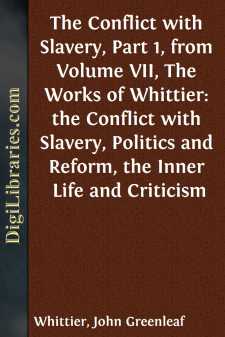Categories
- Antiques & Collectibles 13
- Architecture 36
- Art 48
- Bibles 22
- Biography & Autobiography 813
- Body, Mind & Spirit 142
- Business & Economics 28
- Children's Books 17
- Children's Fiction 14
- Computers 4
- Cooking 94
- Crafts & Hobbies 4
- Drama 346
- Education 46
- Family & Relationships 57
- Fiction 11829
- Games 19
- Gardening 17
- Health & Fitness 34
- History 1377
- House & Home 1
- Humor 147
- Juvenile Fiction 1873
- Juvenile Nonfiction 202
- Language Arts & Disciplines 88
- Law 16
- Literary Collections 686
- Literary Criticism 179
- Mathematics 13
- Medical 41
- Music 40
- Nature 179
- Non-Classifiable 1768
- Performing Arts 7
- Periodicals 1453
- Philosophy 64
- Photography 2
- Poetry 896
- Political Science 203
- Psychology 42
- Reference 154
- Religion 513
- Science 126
- Self-Help 84
- Social Science 81
- Sports & Recreation 34
- Study Aids 3
- Technology & Engineering 59
- Transportation 23
- Travel 463
- True Crime 29
Reform and Politics, Part 2, from Volume VII, The Works of Whittier: the Conflict with Slavery, Politics and Reform, the Inner Life and Criticism
Description:
Excerpt
REFORM AND POLITICS
UTOPIAN SCHEMES AND POLITICAL THEORISTS.
THERE is a large class of men, not in Europe alone, but in this country also, whose constitutional conservatism inclines them to regard any organic change in the government of a state or the social condition of its people with suspicion and distrust. They admit, perhaps, the evils of the old state of things; but they hold them to be inevitable, the alloy necessarily mingled with all which pertains to fallible humanity. Themselves generally enjoying whatever of good belongs to the political or social system in which their lot is cast, they are disposed to look with philosophic indifference upon the evil which only afflicts their neighbors. They wonder why people are not contented with their allotments; they see no reason for change; they ask for quiet and peace in their day; being quite well satisfied with that social condition which an old poet has quaintly described:—
"The citizens like pounded pikes;
The lesser feed the great;
The rich for food seek stomachs,
And the poor for stomachs meat."
This class of our fellow-citizens have an especial dislike of theorists, reformers, uneasy spirits, speculators upon the possibilities of the world's future, constitution builders, and believers in progress. They are satisfied; the world at least goes well enough with them; they sit as comfortable in it as Lafontaine's rat in the cheese; and why should those who would turn it upside down come hither also? Why not let well enough alone? Why tinker creeds, constitutions, and laws, and disturb the good old-fashioned order of things in church and state? The idea of making the world better and happier is to them an absurdity. He who entertains it is a dreamer and a visionary, destitute of common sense and practical wisdom. His project, whatever it may be, is at once pronounced to be impracticable folly, or, as they are pleased to term it, Utopian.
The romance of Sir Thomas More, which has long afforded to the conservatives of church and state a term of contempt applicable to all reformatory schemes and innovations, is one of a series of fabulous writings, in which the authors, living in evil times and unable to actualize their plans for the well-being of society, have resorted to fiction as a safe means of conveying forbidden truths to the popular mind. Plato's "Timaeus," the first of the series, was written after the death of Socrates and the enslavement of the author's country. In this are described the institutions of the Island of Atlantis,—the writer's ideal of a perfect commonwealth. Xenophon, in his "Cyropaedia," has also depicted an imaginary political society by overlaying with fiction historical traditions. At a later period we have the "New Atlantis" of Lord Bacon, and that dream of the "City of the Sun" with which Campanella solaced himself in his long imprisonment.
The "Utopia" of More is perhaps the best of its class....












